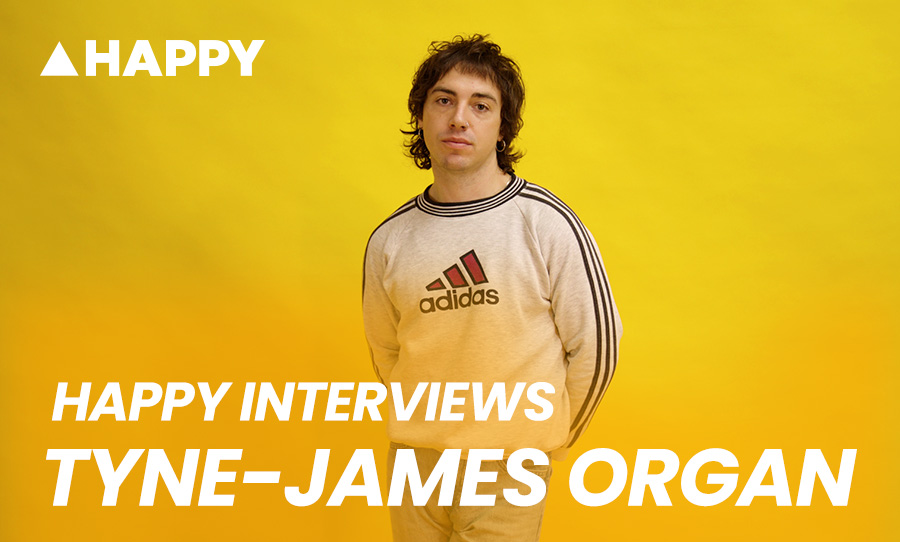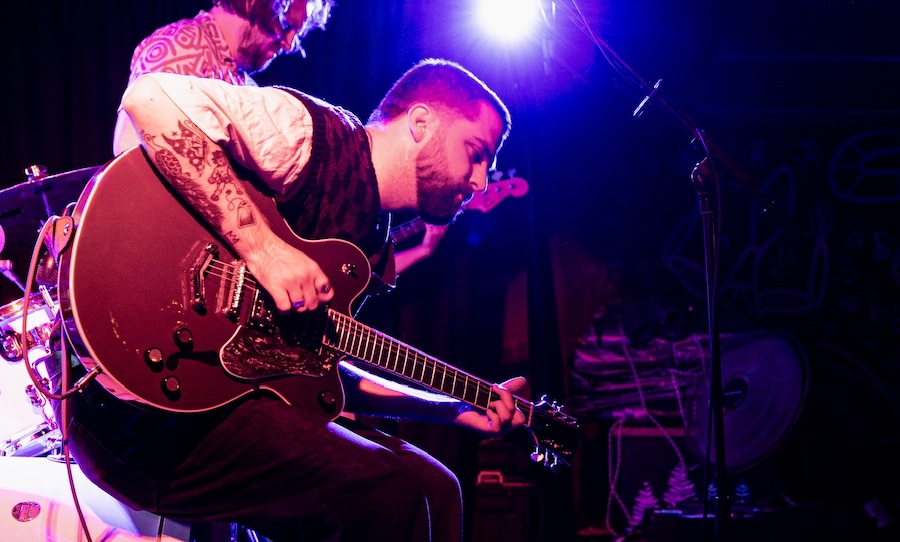Rolling Blackouts Coastal Fever underwent many changes for their upcoming third album, Endless Rooms.
Rolling Blackouts Coastal Fever have been a summer staple of the Australian music scene since their 2017 breakout, French Press. Even back then, there was a darker tinge to their sunshine sound, but on Endless Rooms, the band wholly embrace their “twisted”, more “sinister” side.
Engineering the LP at a lakeside mud-brick house in Taungurung and Yorta Yorta country (2 hours from Melbourne), environment and acoustics played a significant role, making the record one of the group’s naturalistic, expansive records to date. I caught up with RBCF member Joe White to learn more.
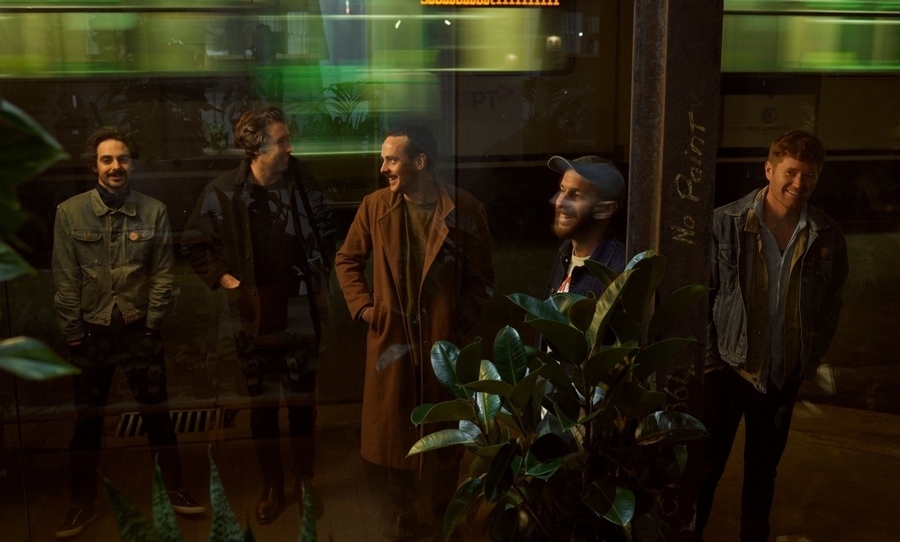
HAPPY: A huge congrats on your latest single, The Way It Shatters. It’s such a high energy tune.
JOE: Oh, thanks. Yeah, it’s good to have it out.
HAPPY: Correct me if I’m wrong. You wrote it about two hours’ drive away from Melbourne in a lakeside house.
JOE: That’s where we recorded it, yeah. I guess initially, the writing of it was kind of just very much at home by myself. You know, as everyone was last year. So yeah, it was kind of just this idea that I threw down on a synthesiser, and I didn’t really think much of it until I brought it to the band later.
And we went up to that to that house, that lakeside house, and we started jamming on these new songs and new ideas. And it sort of came to life there, and Fran came up with the chorus melody. I think he was playing drums and started singing along and that kind of just turned into the chorus. And yeah, it all just fell into place pretty easily that one.
HAPPY: Awesome. In the chorus lyrics, you talk about a “necessary evil”. I was wondering if you could expand on that a little bit.
JOE: I guess that’s kind of a bit tongue in cheek, really. Or kind of… I don’t know. The idea of the whole song is this idea of being very comfortable and happy where we are here and just… sorry, I haven’t really figured out how to say this yet.
HAPPY: That’s all good! No stress.

JOE: I’m just working it out as I go. This is one of the first interviews we’ve done [on Endless Rooms]. But no, what I’m trying to say is, I guess that where we live and where we ended up is this absolute kind of random luck, and the fact that we’re so privileged is just a case of luck. And then there are these people that are in charge or in power that kind of see this luck of this kind of… it’s almost a virtue of theirs, that we’re just lucky. And I just don’t really see that.
You know, it’s the kind of way, basically, the way we treat our refugees. We just lock them up on some island somewhere for an indeterminate amount of time. Um, and I think that’s pretty gross. So the “necessary evil” part is basically kind of getting inside the mind of the people that think that their luck is their virtue.
HAPPY: That’s really interesting. I 100% agree with you about Australia’s awful treatment of refugees, thanks for sharing. The music video for the single, which was directed by Nick, I read that it revisits memories, and that you chose to film at sundown and in dimly lit rooms. I was wondering if you had an idea behind that stylistic decision?
JOE: For a long time, our music has been seen in this very daytime daylight sunshine kind of vibe. So often, people describe our music in that way, and I feel like this record, while it probably still sounds kind of bouncy and sunny and happy, it’s got a bit more darkness to it. A bit more nighttime, something a bit more sinister about it, maybe.
So I think we wanted to just kick off the album with something that was a bit weird and a bit twisted and set at night time. So, yeah, I think the idea was pretty loose. It was very much just… I think it started with the idea of just emerging from the lake because that house that it’s filmed in is the house that we recorded the record in.
HAPPY: Oh, cool.
JOE: That was the house we did a lot of the writing and arranging and everything before we recorded it. So it’s a house that’s very close to our hearts and the lake that is in that in that clip is the lake that’s just like a few hundred metres from the house. So the idea was built around just being able to incorporate that house into the film clip and the lake and, you know, basically from there it was just coming up with some sort of weird, twisted wackiness to go with it.
HAPPY: Mmm. Obviously, the house has had an impact on the music video. Do you think that the environment has had an impact on the songwriting and recording process in any interesting way?
JOE: Yeah, when we went up there, I think it might have been December 2020 to work on some songs, and we recorded some demos with Matt Duffy, who ended up being our engineer on that record. So we sort of treated it as a trial run for whether we could actually record the record in that space.
And we got some really interesting drum sounds and just like the way we’d sort of set up the recording process really worked for us, and the sound was really good. So basically, there were a few songs that… because it’s quite a unique space, I guess, it’s not a recording studio by any means, but it comes with its own unique sounds and we really liked those sounds, so we ended up trying to recreate that again for the actual record.
HAPPY: That’s really cool. Obviously, The Way it Shatters is a reflective song and the music video is dealing with memories, and that kind of made me wonder, is there any strong memories that you and the band always look back to since your beginnings?
JOE: Oh, there’s a lot *laughs*.
HAPPY: I’m sure there are.
JOE: I guess like… We were having a good laugh about it the other day, actually, like the very beginnings of our first trip overseas. We sort of stayed in this kind of like university co-op, where we all slept on the floor in the same room, all lined up like little soldiers. And we bought our sleeping bags from one of those big department stores or whatever, but we bought the cheap ones not knowing that they were the kid’s sized ones.
So we were playing like three or four shows a day, like five days straight, and just absolutely rinsed, you know, coming home, crashing out altogether all lined up with our little kid sleeping bags. It was a pretty funny way to start your international touring career.
HAPPY: Yeah, that’s so funny.
JOE: Yeah, it’s a fond memory to look back on now. We’ve come a fair way since then, so that’s good.
HAPPY: Yeah, it’s the classic humble beginnings, right?
JOE: Yeah, exactly. Yeah.
HAPPY: Love it. I read that in the house, which is obviously very important to the album, it was like you guys were “chasing down songs in a room together”. And yeah, what does that process usually look like for you guys?
JOE: It sort of depends on the song, but I guess for this record, it was a bit different in that a lot of the songs were fairly well written by the time they came to the band. So they sort of had verses and choruses and, you know, lead breaks and everything was sort of all already there, like the DNA of the song was already found, whereas a lot of the time previously we’ve done that a lot more collaboratively in that we just jam on a piece for 10, 20 minutes and then extract or kind of condense that down into a pop song.
Whereas this was like, I think because we were all writing individually because we were not able to be together for so long, just through all that lockdown and border closures and shit. So all of us individually started writing songs from start to finish and sending them across. So it was more so just as an exercise in like finishing songs because it’s sort of something that we’d always done together, like deciding that a song is finished. So we got a lot closer to the finished product before we even came together and chased those songs down, but that’s not to say we didn’t still like exploring them and jamming on them and changing them.
But it was more a case of just chasing down how to make these songs better and make these songs as good as possible. And things like drumbeats and bass lines and extra vocal bits and all that kind of stuff. It was more of a… we were sort of producing it ourselves as well. So it was a process of just getting all the songs into their best possible shape.
HAPPY: Yeah, cool. So a bit more of the refining side of things happened in the house?
JOE: Yeah, yeah.
HAPPY: Cool. Correct me if I’m wrong, but is Endless Rooms your first self-produced project?
JOE: I guess so. I think officially, yes. Although, yeah, we’ve done… the first two EPs were definitely self-produced. And last time we worked with Burke, but this record, we sort of as we were going, we were intending to produce it ourselves, but our engineer, Matt Duffy, he’s a guy that we’ve worked with before and he knows us and our sound inside out.
And he was actually really instrumental in getting a lot of these great sounds and ended up being playing a pretty important role as a producer as well. So we ended up giving him a producer’s credit, I think, on the record as well. So we kind of yeah, went in producing it ourselves and did most of it. But yeah, Matt Duffy was definitely a part of it, too.
HAPPY: I guess that’s a pretty good thing though, right? Like you’ve got someone that knows you sound well, but then you’re also bringing something fresh to the table as well?
JOE: Yeah, he’s… I mean, the freshness of that came from this really interesting space that we were working in. I think maybe because we were a little bit further along in the production of the songs, we had time to explore interesting sounds and different ways of doing things. And in the end, due to lockdowns and all that shit, again, it was just me and Fran. I was doing engineering, just like all the finishing touches, all the vocals and a lot of the keys and some like a lot of overdubs and percussion and all that kind stuff was done back in Melbourne with just me, or just Fran.
Yeah, so we ended up kind of just finishing the record very much in isolation, which was kind of weird, but it gave us… we had literally nothing else to do. Like we go in there over the weekend and have all the time to just explore. So it ended up being kind of… I’d never want to say that lockdown is a good thing, but it kind of worked out for us, having so much time on our hands to finish that record.
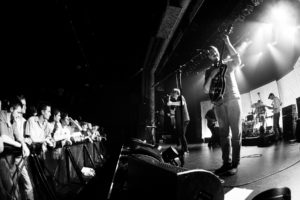
HAPPY: Yeah. I’m sure that lockdown posed other significant challenges for you guys, though, so good on you for sticking through and, you know, getting the project complete.
JOE: Yeah, yeah. Thanks.
HAPPY: You mentioned before about wanting to throw a curveball with the nighttime aesthetic and doing something a little bit darker. In the house, were there any tonal or sonic goals or new sounds that you wanted to bring to the table?
JOE: I think we intended to do the old Midnight Oil banging on the side of the water tank.
HAPPY: Nice, nice.
JOE: But we didn’t get around to it, so we ended up back in back in Brunswick, banging on something else. I can’t remember what it was now. I don’t know. In the house, it was very much just like putting mics in different spots, and running my guitar through two speakers and splitting it and having like one dry and one and wet, and putting mics in… because it was quite an echo-y space, it was like a concrete floor and lots of windows everywhere.
We could put a room mic in the middle of that room and get some really gnarly guitar sounds. Big, roomy sounds that we ended up using on songs like Blue Eye Lake and Vanishing Dots. Yeah, there’s some pretty big, expansive kind of sounds that we were chasing down.
HAPPY: Cool. Big, expansive sounds. That’s the sound bite right there *laughs*. Just before we wrap up, you guys are playing King Street Carnival pretty soon, 12th of March.
JOE: Yeah, that’s it.
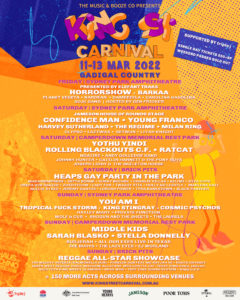
HAPPY: You guys are a kind of King Street Carnival/Crawl veterans, performing back in 2016, right?
JOE: Yeah, we did.
HAPPY: That’s awesome.
JOE: I think it was at the Marley?
HAPPY: Nice
JOE: I don’t think we’ve been back since, though. But yeah, it’d be good to announce it now. It’s like a festival sort of stage set up, I believe.
HAPPY: Yeah. Yeah, it seems like it’s evolved a bit, which is exciting. Are there any acts this year that you’re particularly keen to check out?
JOE: Yeah, I think playing on our stage, I think Yothu Yindi are playing so, yeah, that’s going to be cool.
HAPPY: Oh, that’s awesome. They did the Treaty song, right?
JOE: Yeah, yeah.
HAPPY: Sick, sick.
JOE: That’ll be fun as. I’m looking forward to that. I think if we can stick around for the next day, I think I’d love to see Stella Donnelly again. I’ve seen her a lot, but it’s always a pleasure. So yeah.
HAPPY: Awesome. Thanks so much for your time, man.
JOE: No worries.
Endless Rooms by Rolling Blackouts Coastal Fever releases May 6th. Pre-order here.
Get tix to see Rolling Blackouts Coastal Fever on tour in March/April here.
Photos Supplied
Interview by Manning Patston


